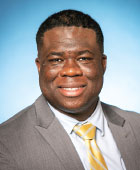Racial Justice Requires Social Guts
Abstract

I love an artful turn of phrase. So it struck me when I discovered that the word exile, from the Latin exsilium, roughly translated to “without bowels.” For Romans, exile was an alternative to state-sanctioned execution. Losing social status and the right to reside in a province signified metaphorical disembowelment akin to social death. Indeed, enemies to society dominated into submission became socially deceased.
As a Black man living in the United States, social margins feel familiar. As APA’s resident-fellow member trustee and UCLA program co-chief resident, those margins mandate repair. Describing 2020 during social distancing required not only writing with friends about structural injustice, but also by myself about racism in medicine. Reactions ranging from congratulations to castigation piqued my curiosity.
I took the opportunity to process at the Learning for Leadership conference, whose reputation preceded itself as a far-out, psychoanalytic adventure. Reflecting afterward, two realizations about race and group relations revealed themselves:
Fear of speaking up in a group is rooted in a fear of exile. During my time at Princeton—a 45-month-long tour of social awkwardness—I often flashed back to growing up as a child of Ghanaian immigrants in a racially homogenous white suburb near Scranton, Pa. As my peers appreciated the meaning of my skin color, I struggled more and more to fit in as the painfully shy, dark-skinned Black kid seemingly unlike “other Black people on TV.” I lacked confidence to raise my voice loud enough to be heard, and waves of shame often followed.
I could never ride those waves to find my voice until my racial awakening made me realize being Black meant, many times, automatic social rejection. Subconsciously understanding the relationship between my race and my social death liberated my voice from fear. As a Black adolescent unsuccessfully seeking white acceptance, I learned a racist self-hatred that poisoned my self-worth and sterilized my social life.Only after my social death—and the birth of my self-worth apart from white acceptance—could Blackness fortify my gut against exile. Learning for Leadership rendered the risk explicit: Speaking up meant risking social rejection. It requires social guts.
Fear of speaking on racism is rooted in fear of being called racist. Many white people stay silent about racism for fear of public shame and rejection. One poorly crafted statement here, another fumbled phrase there, and with one concerted decree—“Racist!”—comes exile, so the story goes. And yes, we all fear exile. To this day, it still gives me pause. Prospective social marginalization can silence any pro-social human: The risk is real.
But like most of our society’s punishments, the severity of exile correlates with race. The very real pain for white people of being “canceled,” called racist, or unfriended on social media seems minor compared with the surreal, life-canceling racism that spent 8 minutes and 46 seconds lynching George Floyd or the disproportionate COVID-19 burden exposing systemic racism in health and health care over the last eight months.
Giving in to the fear and pain of white exile selfishly rationalizes and thereby enables silence about racism. For white people, silence about racism means perpetuating actual loss of Black life to racism. For white physicians, silence about racism violates medicine’s responsibility to do no harm. For white psychiatrists, silence about racism prevents rebirth into the anti-racist clinical practice our patients deserve.
It took years for me to understand that practicing excellent medicine required I risk my social guts. This is how I know asking all of us to talk about racism—however clumsily, even at risk of being called a racist—is not too much to ask. To borrow from James Baldwin, “not everything that is faced can be changed, but nothing can be changed until it is faced.” However unwieldy our first turns of phrase, real talk about racism from white psychiatrists will be a welcome step toward exiling racism together. ■
Dr Mensah acknowledges Ann Crawford-Roberts, M.D., M.P.H., Sonya Shadravan, M.D., and Justin Key, M.D., for feedback on this piece. None were compensated.
References
Crawford-Roberts A, Shadravan S, Tsai J, et al. George Floyd’s Autopsy and the Structural Gaslighting of America. Scientific American. June 6, 2020.
Mensah MO. Majority Taxes — Toward Antiracist Allyship in Medicine. New Engl J Med.. 2020;383(4):e23.
Hayden C, Molenkamp RJ. Tavistock primer II. AK Rice Institute for Study of Social Systems. Jupiter, Fla.; 2002.
Jones CP. Levels of racism: a theoretic framework and a gardener’s tale. . Am J Public Health. 2000;90(8):1212.
Egede LE, Walker RJ. Structural Racism, Social Risk Factors, and Covid-19 — A Dangerous Convergence for Black Americans. New Engl J Med. July 22, 2020.



